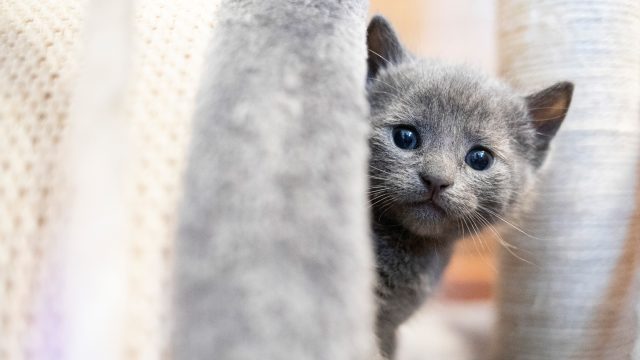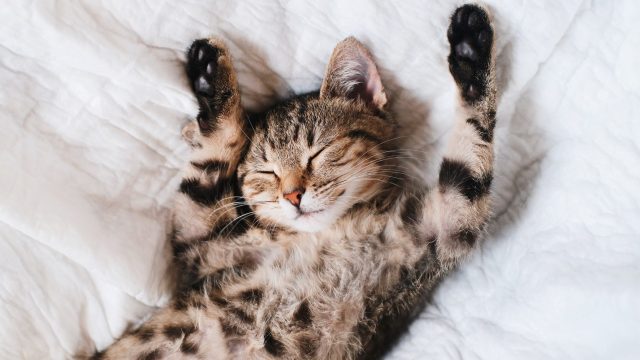Kristen Lindsey in Court to Fight for Her Veterinary License
Was the orange tabby cat in Kristen Lindsey’s April 2015 Facebook post a companion animal named “Tiger,” killed without his owner’s consent?
This was the main point of heated debate in Austin, Texas this week at the State Office of Administrative Hearings (SOAH), when Kristen Lindsey faced the Texas Board of Veterinary Medical Examiners (TBVME) over the revocation of her veterinary license before two administrative law judges. In April 2015, Kristen Lindsey shot a cat with a bow and arrow and bragged about the killing on Facebook. Later that year, the Texas Veterinary Board decided to revoke her license after conducting a full investigation and hearing testimony from witnesses and advocates, including the Animal Legal Defense Fund.
In this week’s hearing, the Veterinary Board called a slew of fact and expert witnesses to bolster its case, both those who knew “Tiger,” the alleged feline victim, and veterinary experts on felines and proper methods of euthanasia. Multiple witnesses testified about the identity of the cat in the photograph, explaining that the distinctive markings on the cat’s left leg indisputably identified him as Tiger. Clare Johnson, Tiger’s owner, took the stand and testified that she was “as certain as I can be” that the cat in the grotesque Facebook photo was Tiger. Feline expert and long-time Texas veterinarian Dr. William Folger testified that the white spot on the cat’s left hind leg was “like a unique tattoo” and explained that the cat’s anatomy was reflective of a neutered cat like Tiger—not an intact feral cat.
In perhaps the most devastating testimony of the two-day hearing, Dr. Folger testified that the cat seen dangling from the arrow was, in his expert opinion, still alive at the time the photo was taken, given the angle of the cat’s limbs in the picture. Dr. Gail Golab, an expert in euthanasia policies for the American Veterinary Medical Association (AVMA), emphasized that “humane” euthanasia is that which renders an animal instantaneously unconscious, and that the preferred method of companion animal euthanasia is intravenous injection. Dr. Golab emphasized that there is insufficient scientific data to evaluate the humaneness of a bow-and-arrow shot, but that the AVMA considers a captive bolt shot humane euthanasia if certain conditions are met, including the animal already being anesthetized and the proximity and precision of the shot.
“I had made a good shot to be quite honest,” said Lindsey on the stand. She expressed little remorse in killing a cat she says she thought was feral and insisted that she had a right to protect her property from an animal she claimed was spraying and fighting with her animals. She also claimed the cat had a “gross appearance” and was an intact male, and that “feral cats are an issue that need to be managed.”
Legally, it does not matter if Lindsey thought the cat was feral, only that she was aware of a substantial and unjustifiable risk that the cat was owned and disregarded that risk when she made the fatal shot (in other words, acted “recklessly”). The SOAH must decide by a “preponderance of evidence” (more likely than not, a lower standard than the criminal justice system’s “beyond a reasonable doubt” standard) that Lindsey violated the rules of veterinary ethics, here based on committing animal cruelty. The Texas Veterinary Board has premised its case on Texas Penal Code § 42.092 (b)(2), recklessly killing an animal “without the owner’s effective consent.” (While feral cats are included under the definition of “animal” in Texas cruelty law, the Vet Board decided to pursue only one theory of animal cruelty, that the cat was owned, possibly due to the weight of evidence identifying the victim as Tiger). TBVME Rule of Professional Conduct § 573.4 allows the Vet Board to impose sanctions when a veterinarian violates any Texas law, regardless of a criminal conviction.
The Animal Legal Defense Fund continues to support the Texas Board of Veterinary Medical Examiners, and commends the TBVME Staff Attorney Michelle Griffin in particular for her tremendous job presenting the Vet Board’s case at this week’s hearing. Both parties will submit written closing arguments to SOAH in June 2016, and we expect a decision on the revocation of Kristen Lindsey’s license later this summer.
Focus Area
Related
-
Resolution Opposing Elective Cat Declaw Surgeries Introduced in the U.S. House of Representatives
Declawing is a cruel surgical procedure to remove the last bone in a cat's toesDecember 16, 2025 Press Release -
California Governor Signs Animal Protection Bills into Law
The Animal Legal Defense Fund sponsored two bills protecting cats and wild animalsOctober 21, 2025 News -
ALDF Urges Justice for Cat Victims in Elkhart County
The county’s prosecutor dismissed criminal charges against the manufacturing plant employees who killed two feral cats in a trash compactorAugust 11, 2025 News



